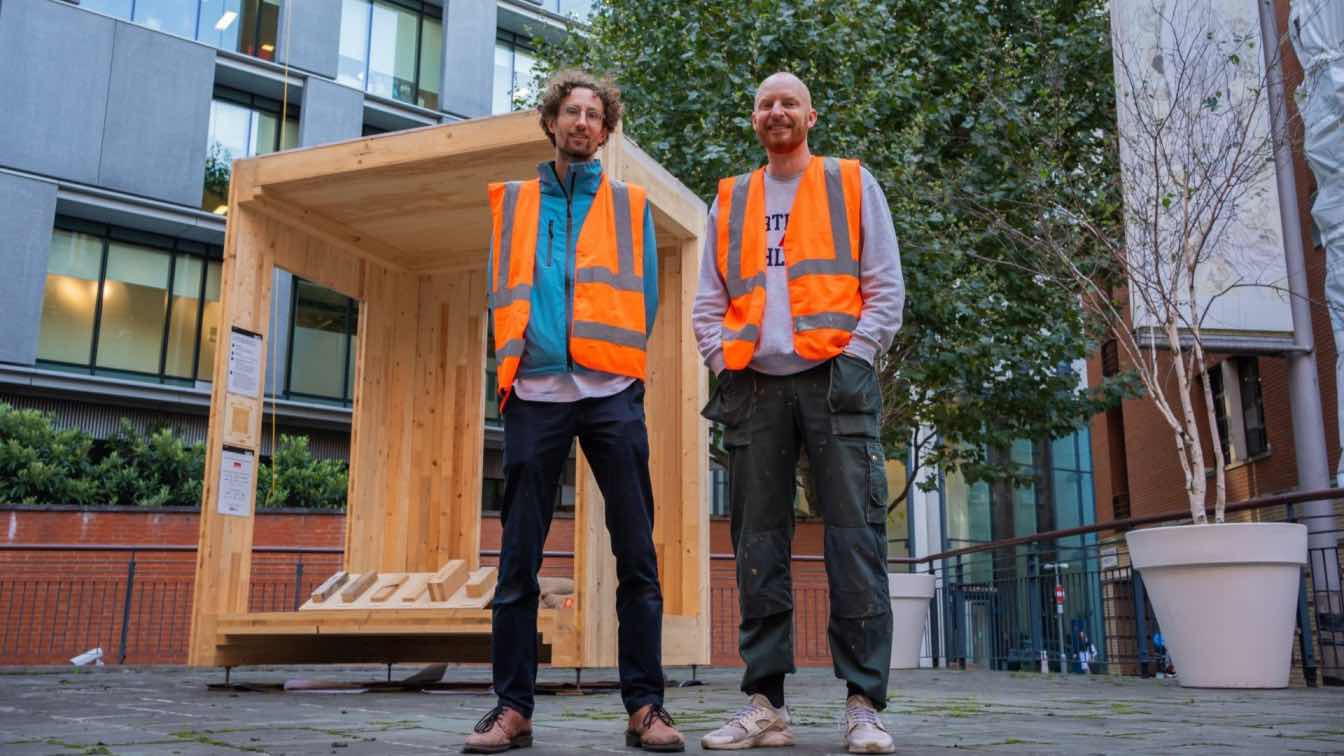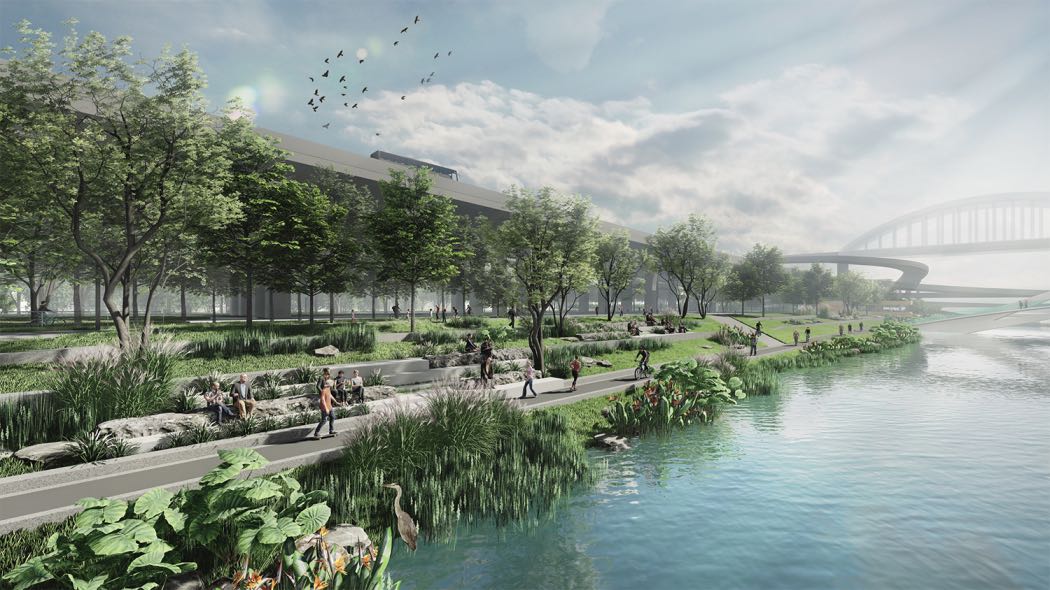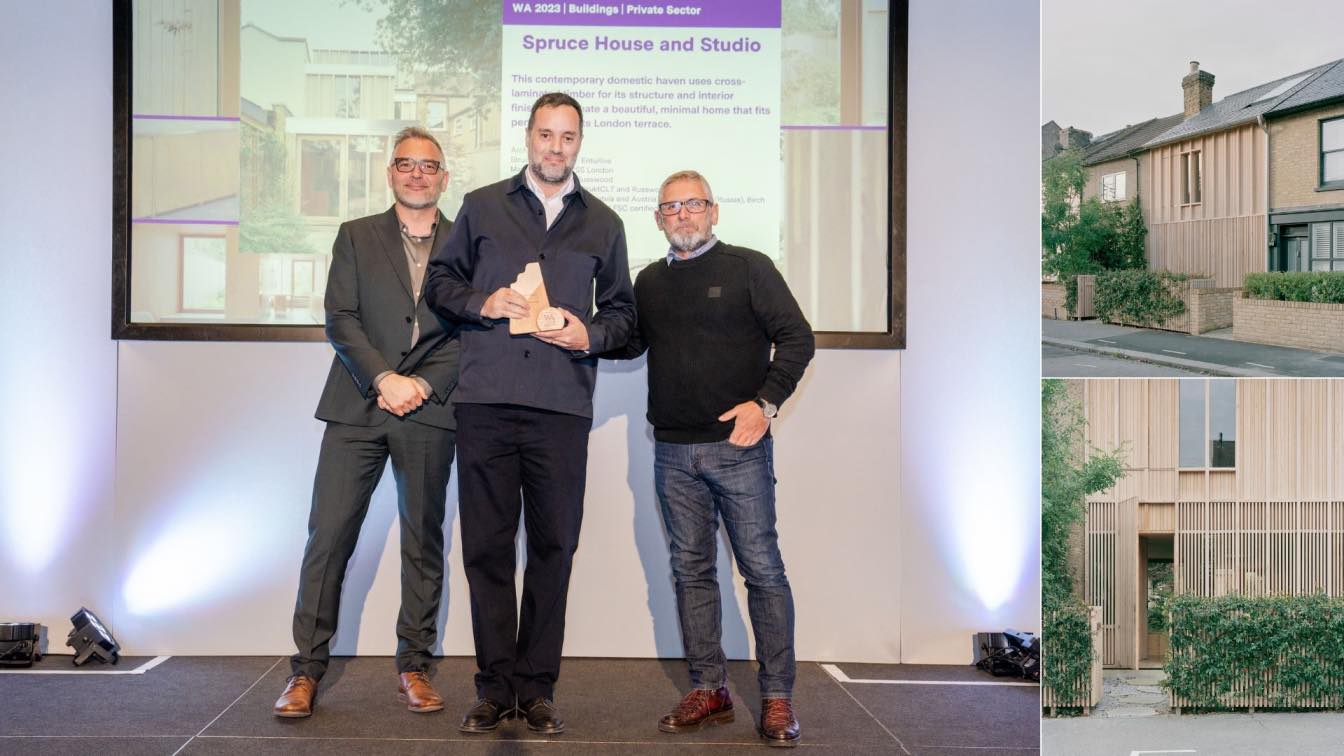A groundbreaking research project is set to make its global debut at London Design Festival from 18 to 21 September at the OXO Tower Courtyard and Platform.
CascadeUp is the first building-scale demonstration of a glulam and cross-laminated timber (CLT) structure which has been created entirely out of waste timber from demolition.
The 3.5-metre high, 2.5-metre wide and 2-metre deep modular structure was designed by University College London’s Circular Economy Lab and UK CLT to provide a stage to share planet-saving ideas.
“We can’t solve the climate crisis without transforming our built environment,”says Dr Colin Rose, an architect, Senior Research Fellow at UCL and Founding Partner of UK CLT, who has led on the project.
“CascadeUp fully embraces circularity – taking wood which would be chipped and downcycled or sent to the incinerator and instead remanufacturing it to make a sustainable alternative to high-carbon structural products such as concrete, steel and brick.
“Taken at scale, this is an approach that can boost local economies and drive new employment in reclamation and manufacturing sectors close to urban areas.”
The CascadeUp pilot is the result of years of research to rethink how we can transform our built environment, and rapidly shift to a circular economy.
With the built environment responsible for 30-42% of carbon emissions, over 60% of the UK's waste, and ~50% of all extracted materials, this could have a major impact.
Fully modular and reusable, and designed with disassembly in mind, the structure can be easily upgraded and repurposed, ensuring that no materials are discarded.
The project is the first of its kind to test this approach to the manufacture of wood-based panels and beams from reused, solid timber and assemble it at building-scale - which can provide a way to extend wood’s ability to store carbon over the long-term
Visitors to the pilot will have the opportunity to view the structure and learn more about its design and construction, material properties and scalability, and environmental benefits.
You can also learn more about the project directly from the UCL team, with talks from 12-12.30 and 16-16:30 on Wednesday 18 September, Friday 20 September, and Saturday 21 September. Register now.
BuildZero, a university-led research programme dedicated to scaling up a systems level approach to deliver a zero extract, zero carbon and zero waste built environment, will be hosting a talk from the platform on Thursday 19 September, 16-17:00. Register now.
CascadeUp forms one exciting component of a South Bank design district which features both Material Matters and the Wood Awards.
Collectively, all three tell a powerful story of a more sustainable, low-carbon future, and showcase the teams working now to make this possible.
The project has been carried out in partnership with Portakabin, and with the support of a range of other supporting collaborators – including Timber Development UK.
About the pilot
CascadeUp explores the potential of CLST (cross-laminated secondary timber) and glulamST (glued-laminated secondary timber) – materials that have a fully traceable, local, and socially fair supply chain.
By reusing timber from demolition, this project provides an alternative to the increasing use of primary timber as a construction material, avoids or delays the need for incineration, which releases stored carbon back into the atmosphere, and instead promotes timber as a long-term carbon store within the built environment.
Once its structural life has concluded, the timber used in this project can still be recycled into other products like chipboard, and only as a last resort, incinerated for energy. This highlights the transformative potential of circular economy principles in the built environment.
More information about the CascadeUp pilot can be found here:
Portakabin
Since 1961, Portakabin has been at the forefront of construction innovation, pioneering modular construction as a smarter way to build. Over the years, the company has changed, adapted, and grown, but always with the aim of making a better future by reusing and repurposing its products and buildings. As the world faces enormous climate challenges, Portakabin is preparing to play its part by looking at new and innovative ways to increase circularity in its business model.
UK CLT
UK CLT is a research and development led company that localises the manufacture of cross-laminated timber and glulam using high quality recovered wood. We turn circular economic theory into practical action, in pursuit of a sustainable and regenerative built environment.
Timber Development UK
Timber Development UK has been formed from the merger of the two largest and longest-established organisations in the supply chain, the Timber Trade Federation (TTF) and the Timber Research and Development Association (TRADA). Bringing these two associations together as one has created the largest, most comprehensive supply chain body in the UK, spanning from sawmill to specifier and all the points in between. TDUK aims to connect the timber supply chain, lead best practice, and accelerate a low carbon future.
BuildZero
BuildZero's vision is one of a building stock that no longer relies on extraction of new resources, by leveraging the circular economy (CE) to meet materials needs, and eliminating both waste and carbon emissions from material extraction and production. BuildZero is funded by the Engineering and Physical Sciences Research Council, with the research conducted by the University of Manchester, University of Cambridge, University of Bath, Cardiff University, and University of Sheffield.
Eurban
Eurban are an independent UK-based company leading the field in the design, manufacture and assembly of solid timber structures. Their collection of completed solid timber buildings outnumbers that of any other UK company, and in-house expertise spans both design and installation services.





